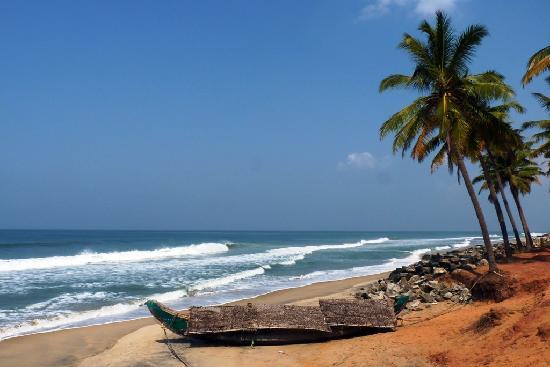Varkala is a coastal town and municipality in Thiruvananthapuram district situated in the Indian state of Kerala. It is the suburban town of Thiruvananthapuram. It is located 50 kilometres north-west of Thiruvananthapuram (Trivandrum) and 37 km south-west of Kollam city.
Varkala is the only place in southern Kerala where cliffs are found adjacent to the Arabian Sea.
These tertiary sedimentary formation cliffs are a unique geological feature on the otherwise flat Kerala coast, and is known among geologists as Varkala Formation and a geological monument as declared by the Geological Survey of India. There are numerous water spouts and spas on the sides of these cliffs.
Varkala is also famous for the 2,000-year old Janardana Swami Temple which is an important Vaishnavaite shrine in India and is often referred to as Dakshin Kashi (Benares of the South). The temple is located close to the Papanasam beach, which is considered to have holy waters which wash away sins, and is also an important Ayurveda treatment centre. The temple has an ancient bell removed from a shipwreck, donated by the captain of the Dutch vessel which sank near Varkala without causing any casualties.
Another major landmark in Varkala is the Sivagiri Mutt, established by the social reformer Sree Narayana Guru. The hill-top mausoleum of Sree Narayana Guru is one of the most famous monuments in Kerala.
Tourism started thriving by the end of last century at the Varkala beach(Papanasam), which was earlier famous for Vavu Beli, a Hindu custom performed at the beach. Another beach is at Tiruvambadi, one kilometre away and en route the old palace. There is a helipad close to the beach. Scores of ayurvedic massage parlours line the promenade above the beach.
watch video on:https://www.youtube.com/watch?v=A-getH9sN1g&feature=c4-overview&list=UUvaHCqWXEJLapJWFIo5iXSw





Comments
Post a Comment